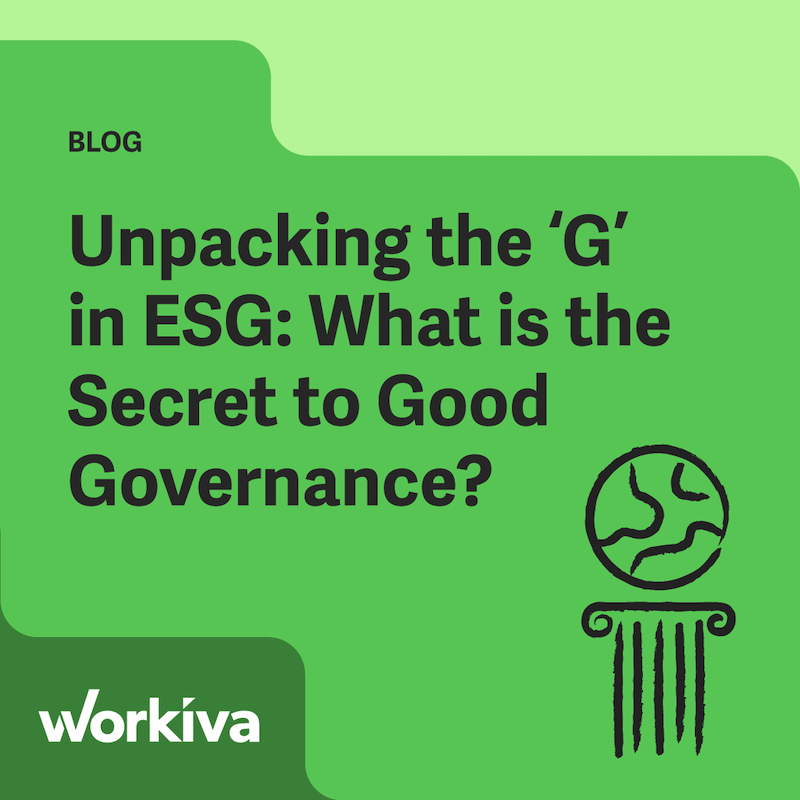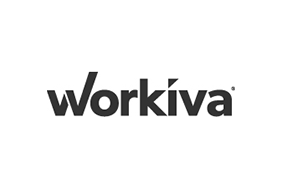Unpacking the 'G' in ESG: What Is the Secret to Good Governance?
Published 10-06-22
Submitted by Workiva

Originally published on Workiva
by Erik Saito, Senior Vice President & General Manager, EMEA & APAC, Workiva
At first glance, governance can appear as the outlier of the three ESG pillars: environmental, social, and governance. While the ‘E’ and the ‘S’ focus on a company’s relationship with the wider world, the purpose of the ‘G’ is to look internally, assessing how the company is run. In many ways, it can be seen as the oldest of the three: companies have been setting rules, establishing hierarchy, and safeguarding against corruption and fraud for almost as long as companies have been around. But when placed alongside the topical—and hugely important—issues of environmental and social impact, talk of governance can often fade into the background.
Organizations looking to drive value in their ESG reporting, however, should be putting governance front and center. Not only does it have a strong, direct link with corporate value, but it also pertains to the very foundations of the organization, influencing every other area, including environmental and social factors.
Our recent survey found that 94% of businesses have been having more conversations about governance and controls within the context of their corporate reporting. Looking at the companies now leading the way, what are they focusing on when incorporating governance into their ESG reporting?
Getting the formula right
Most of us are aware of the concept of “garbage in, garbage out,” or the idea in computer science that entering incorrect data will deliver a nonsensical output, regardless of how well an algorithm has been designed.
This principle can also be applied to reporting. A company may very well set themselves the very highest ESG goals, providing analysis on every possible metric; if the data are unreliable, the report is meaningless—and the bond of trust between company and investor is lost.
Governance is, in essence, the structure that exists to protect this trust. Successful governance reporting, then, needs to demonstrate why the data in your financial and non-financial reports should be deemed reliable. Data is often generated by humans, sometimes (depending on the industry and production line) by hand, before being passed from one team to the next. So how do you ensure that it is accurate from the outset and that it remains the same by the time it reaches C-level executives?
Companies that focus on showcasing the verifiability of their data and the transparency of their overall structure strengthen the impact of their entire report.
Understanding materiality
Another important question governance reporting needs to address is how materiality is assessed. Who gets to decide what the most important issues are for the business? How are these decisions made, and how often are they reviewed?
What is considered material varies considerably depending on the industry, location, and size of the organization. It will also be affected by wider socioeconomic or geopolitical factors and can change rapidly.
Good governance needs to know what to measure and where the biggest impacts can be made. It assesses which areas present the biggest risks and opportunities for the company, and then provides a solid structure to protect against those risks or draw on those opportunities.
Companies need to have a structure in place to establish that these important strategic decisions are made in a consistent, holistic manner, taking the full picture into account and allowing for a change of direction when necessary. A strong ESG report needs to clearly explain what that structure is, so investors can see not only what decisions have been made, but also how and why they came about.
Leveraging the employer advantage
Governance is often thought of as something that is primarily of interest to investors, but it is just as important to staff.
Good governance is key to retaining the best talent, which, in turn, affects the long-term value of the company. How an organization is run—from internal hierarchies and work processes to the structures in place protecting the workforce—is arguably the biggest determinant of whether individuals are happy in their roles. Increasingly, employees are also stating that working for a company that aligns with their values, and that makes a positive social or environmental impact on the world, is essential when choosing a new job.
While companies can easily make bold claims about how much they value both their employees and the planet, these promises can quickly start to unravel if solid governance is not established and upheld. As the workforce becomes increasingly savvy and ethically discerning, pressure is mounting at both ends of the corporate chain. Employers who know how to implement and transparently communicate their governance hold a significant competitive advantage in attracting and retaining talent.
The tone starts at the top
When it comes to making significant business decisions, an ongoing conversation between executives and investors is essential. Reviewing stakeholder expectations on an ongoing basis is both a key part of a successful governance strategy and a tool for making further governance decisions.
Perhaps the biggest differentiator when it comes to successful governance is the extent to which senior executives are willing to get involved at every level.
Those who stand out are taking the conversation out of the boardroom and onto the front lines of the company, looking at day-to-day details and understanding immediate challenges, practical limitations, and their impact on the bigger picture. It’s by diving under the hood and engaging with the nuts and bolts of their organization that business leaders will truly begin to deliver value with their ESG reporting.
Large companies have a significant impact on the world. Those that recognize this fact and work to make their impact as positive as possible are now leading the way, attracting investors as they continue to grow. But this can’t be done just by describing the "what." The "why," "how," and "who" must also be explained. By establishing transparency, trust can be secured.

Workiva
Workiva
Workiva Inc. (NYSE:WK) is on a mission to power transparent reporting for a better world. We build and deliver the world’s leading regulatory, financial and ESG reporting solutions to meet stakeholder demands for action, transparency, and disclosure of financial and non-financial data. Our cloud-based platform simplifies the most complex reporting and disclosure challenges by streamlining processes, connecting data and teams, and ensuring consistency. Learn more at workiva.com.
More from Workiva

